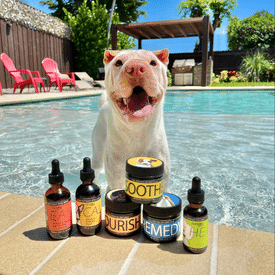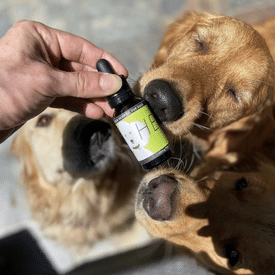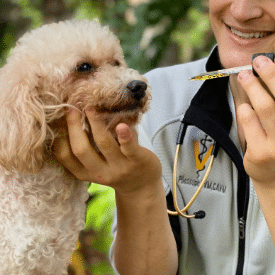How Nutrition Impacts Overall Health with Rebecca Rose

Imagine this: your sweet, wonderful dog has begun suffering from allergies. They are uncomfortable, itchy, and overall not themselves. You try CBD, which helps, but as soon as they miss a dose the allergies are back. How can you solve the problem without just treating the symptoms? Rebecca Rose, founder of InClover, knows exactly how to help.
“About 70 to 80 percent of the immune system is housed in the digestive tract. So if we can get a healthy digestive system, it will translate into a healthy immune system.”
Rebecca Rose
Pet problems and ailments all start with what an animal is eating and what their gut microbiome is like. You may have heard that prebiotics, probiotics, and digestive enzymes can help get your pet’s gut health in check, but it is important to know what these terms mean and how to use them.
What is a digestive enzyme?
To start, digestive enzymes are an important part of gut health. Digestive enzymes are not a living thing but are active. This means that if digestive enzymes are heated above 120 degrees F they will deactivate and won’t work, and you cannot reactivate them. If you have a kibble, which was heated when manufactured, the digestive enzymes will not be present. This is similar to CBD because if there is a baked treat with hemp extract baked into it, the composition changes and it is no longer the same product. The process of heating will make it inactive.
“We know that as animals age, they cannot produce the enzymes that are needed to break down the nutrients in the food, so supplementation is necessary,” says Rose. “If you have an animal with any type of dietary issues where it is hard for them to process their food, you would want to supplement with digestive enzymes.”
What is a probiotic?
A probiotic is a live, beneficial bacteria which is typically from a goat or a cow, the earth (soil), and sometimes even from baby poop.
Probiotics are very difficult to get to, and through, the digestive tract. They have to survive all the way through the large intestine, which takes a lot of stamina. People who produce probiotics take spore formers, which are probiotics in a protective shell, and manipulate them to make them more resilient. Then they put billions of them into the system.
“InClover doesn’t use any probiotics,” says Rose, “We believe that they can do one of two things: pass through and not make it to the large intestine and be killed in the process, or if they don’t pass through and you have an immunocompromised system, the probiotics will take the place of the native beneficial bacteria in the animal’s system. Which changes the microbiome to foreign bacteria and not the good native bacteria.”
What is a prebiotic?
Prebiotics selectively feed good bacteria, and because of the differences between the cell wall, the bad bacteria cannot absorb and eat the prebiotic. Prebiotics are heat stable, which means that they can be heated (so they can be used in muffin mix, for example, or dog treats). A prebiotic selectively feeds and increases the balance of the good bacteria in the gut. Because the large intestine is like a PVC pipe of sticky lining, the good bacteria will stick to the walls and the bad bacteria will be flushed through. It is a good way to increase the good bacteria without having to introduce foreign bacteria.
Which animals should take prebiotics and digestive enzymes?
If a dog is on a raw diet with no issues and they become a senior dog with issues, you want to introduce a digestive enzyme and a prebiotic.
“We developed Opti-gest which just has those two things,” says Rose. “Digestive enzymes and a clinically tested prebiotic. Any dog or cat can use that – even people can take it. It is human quality.”
How can people learn more about gut health?
“It can be frustrating [to see pet trends that are wrong] but most of the time people want to do the right thing and they are just uninformed,” says Rose. “I have put a lot of my energy in groups like the national animal supplement council. It is a nonprofit that works to help inform supplement companies about regulations, quality, and how to do it the right way.”
Rose also has a few favorite books for those looking to learn more about gut health.
“The author Dickie Fuller has a book on enzymes – its an old book and is kind of hard to get, but it is a nice resource and I love listening to podcasts that are talking about the gut health,” says Rose. “I do a lot of work and researching online at the NIH database. Anybody can look at that and you can find some really nice information out of that. InClover.com has blogs and information to keep people aware of what is going on in the field. If you can, find your north star, someone who you trust about animal wellness, get your information from that source.”
To learn more about gut health, visit www.angelaardolino.com.
Angela Ardolino is a holistic pet expert who has been caring for animals for over 20 years, and operates a rescue farm in Lutz, Florida. She is also the owner of Beautify the Beast, a natural pet salon and shop. After getting her certificate in Medical Cannabis Biology and Therapeutic use from the University of Vermont School of Medicine, she founded CBD Dog Healthto provide high quality, all-natural medical cannabis products designed specifically for pets. Angela has five dogs, plus 4-10 at any time that she is fostering or boarding; visit www.angelaardolino.com for more information.
Rebecca Rose is the founder of InClover. Rebecca uses her biochemistry education and experience in healthcare and biotechnology research to scientifically design all of InClover’s products to work with pets’ unique physiology. When she isn’t getting really excited explaining the chemical structure of glucosamine or how prebiotics work, she enjoys being outdoors and in the barn. Whether she is riding horses or snuggling a chicken, she is happiest surrounded by animals. InClover was founded by a biochemist who has dedicated her life to the study of how nutrition supports overall health.















